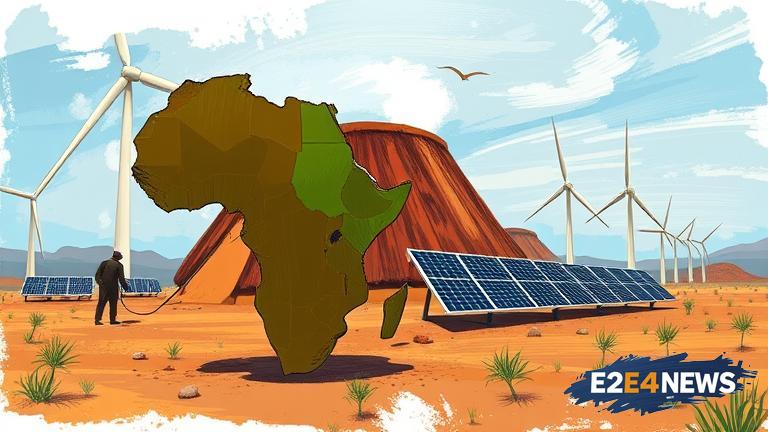The African continent is witnessing a significant shift towards renewable energy, driven by the need to address the pressing issues of energy access, energy security, and climate change. With a growing population and increasing economic activities, the demand for energy is on the rise, and renewable energy is emerging as a viable solution. Solar and wind power are the most prominent forms of renewable energy in Africa, with countries like South Africa, Egypt, and Morocco leading the way. The cost of renewable energy technologies has decreased dramatically over the years, making them more competitive with fossil fuels. This has led to an increase in investments in the renewable energy sector, with many international companies and organizations committing to support Africa’s energy transition. The African Union’s Agenda 2063 and the United Nations’ Sustainable Development Goals (SDGs) have also played a crucial role in promoting renewable energy in Africa. The continent’s abundant natural resources, including solar and wind, provide a unique opportunity for Africa to leapfrog traditional energy systems and adopt renewable energy technologies. Many African countries have set ambitious targets to increase their share of renewable energy in the energy mix, with some aiming to reach 100% renewable energy by 2050. However, despite the progress made, there are still significant challenges to be addressed, including the lack of infrastructure, limited access to financing, and the need for policy and regulatory frameworks that support the development of renewable energy. The private sector is also playing a critical role in driving the growth of renewable energy in Africa, with many companies investing in solar and wind farms, as well as energy storage and grid infrastructure. International cooperation and partnerships are also essential in supporting Africa’s energy transition, with many countries and organizations providing technical assistance, financing, and capacity-building programs. The benefits of renewable energy are numerous, including reduced greenhouse gas emissions, improved air quality, and enhanced energy security. Renewable energy can also create jobs, stimulate local economies, and contribute to poverty reduction. In addition, renewable energy can help to address the issue of energy access, which is a major challenge in many African countries. According to the International Energy Agency (IEA), approximately 600 million people in Africa lack access to electricity, and renewable energy can help to bridge this gap. The use of renewable energy can also help to reduce the burden on traditional energy sources, such as coal and gas, which are finite resources. Furthermore, renewable energy can help to mitigate the impacts of climate change, which is a major concern for Africa. The continent is already experiencing the effects of climate change, including rising temperatures, changing precipitation patterns, and increased frequency of extreme weather events. By transitioning to renewable energy, Africa can reduce its carbon footprint and contribute to global efforts to address climate change. In conclusion, Africa’s renewable energy revolution is gaining momentum, driven by the need to address energy access, energy security, and climate change. With the right policies, investments, and international cooperation, Africa can unlock its vast renewable energy potential and create a sustainable energy future for generations to come. The future of energy in Africa is renewable, and it is essential that we continue to support and promote the growth of this sector. By doing so, we can create a brighter future for Africa and contribute to a more sustainable world. The time to act is now, and we must work together to ensure that Africa’s renewable energy revolution is a success. The benefits of renewable energy are clear, and it is essential that we continue to invest in and promote this sector. With the right approach, Africa can become a leader in the global renewable energy market and create a sustainable energy future for generations to come.
